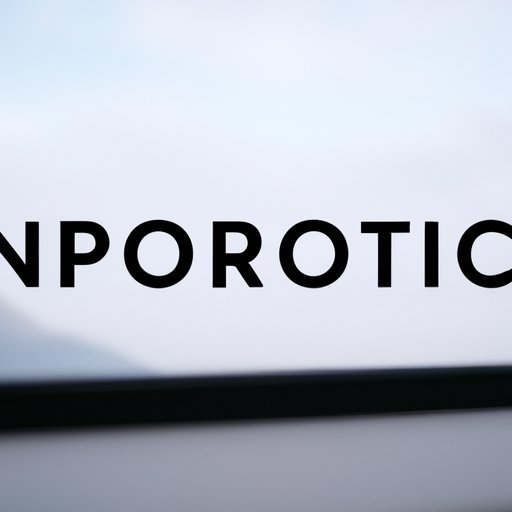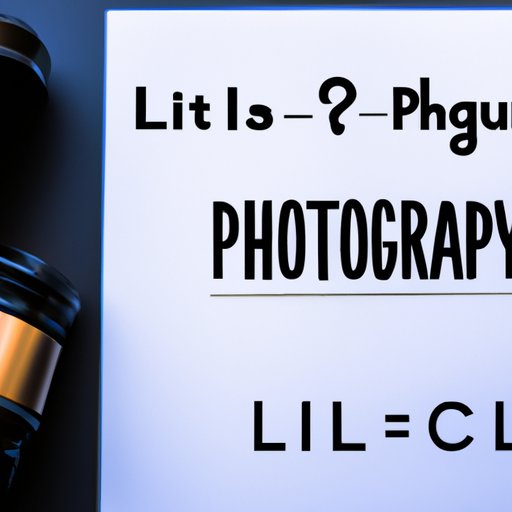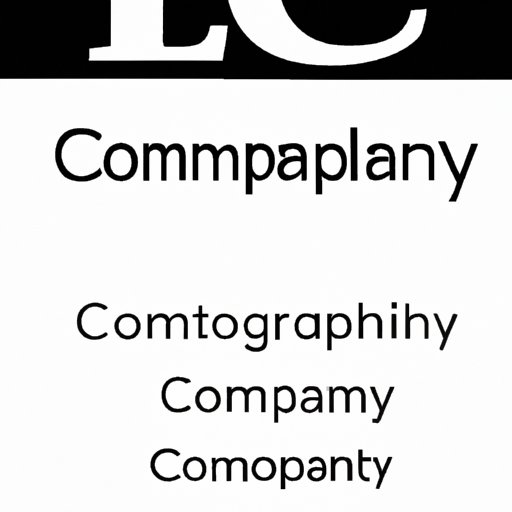Introduction
If you are looking to start a photography business, you may be wondering if it is necessary to form an LLC (limited liability company). An LLC is a type of business entity that provides limited liability protection for its owners from personal liability for business debts and obligations. This means that if your business fails, your personal assets will not be at risk. In this article, we will explore the pros and cons of forming an LLC for a photography business, as well as alternative options, so that you can make an informed decision about whether or not it is right for you.
Understanding the Tax Benefits of Establishing an LLC for a Photography Business
One of the main benefits of forming an LLC for a photography business is the potential tax savings. An LLC is considered a “pass-through” entity, meaning that all profits and losses are passed through to the owner(s) and taxed on their individual returns. This can be beneficial because it allows you to deduct business expenses such as office supplies, equipment, and travel expenses from your taxes. Additionally, LLCs offer more flexibility when it comes to how you structure your business and how you file your taxes, which can result in further tax savings.
However, it is important to note that there are some drawbacks to forming an LLC for a photography business. For example, LLCs typically require more paperwork than other business entities, such as sole proprietorships or partnerships. Additionally, LLCs require ongoing compliance measures, such as filing annual reports and paying fees, which can be time consuming and costly. Finally, there may be state-level taxes associated with forming an LLC, depending on where you live.

Exploring Alternatives to LLC Formation for a Photography Business
If you decide that an LLC is not right for your photography business, there are several alternative business structures to consider. The most common alternatives are sole proprietorships, partnerships, and corporations.
A sole proprietorship is the simplest and least expensive form of business organization. It involves one person owning and operating a business, and all profits and losses are passed through to the owner and reported on their individual tax return. However, it does not provide any liability protection, so the owner is personally liable for all debts and obligations of the business.
A partnership is similar to a sole proprietorship, but it involves two or more people. All partners share responsibility for the business and all profits and losses are passed through to the individual partners and reported on their individual tax returns. Like a sole proprietorship, a partnership does not provide any liability protection, so all partners are personally liable for all debts and obligations of the business.
Finally, a corporation is a more complex and expensive business structure. It is a separate legal entity, meaning that it has its own rights and liabilities distinct from those of its owners. All profits and losses are reported on the corporate tax return, and shareholders are not personally liable for the debts and obligations of the corporation. However, corporations are subject to double taxation, meaning that the income is taxed once at the corporate level and again when distributed to shareholders as dividends.

Deciding If an LLC Is Right for Your Photography Business
When deciding if an LLC is right for your photography business, there are several factors to consider. First, consider the size and scope of your business. If you are just starting out and do not anticipate a lot of revenue or growth, a sole proprietorship or partnership may be more suitable. On the other hand, if you expect significant growth and want to protect your personal assets, an LLC may be the better option.
You should also consider the nature of your business. If you are engaging in high-risk activities, such as working with hazardous materials or dealing with large amounts of money, an LLC may be the best choice. If you are engaging in low-risk activities, such as selling products online or providing services, a sole proprietorship or partnership may be sufficient.
Finally, consider the cost of setting up and maintaining an LLC. Depending on your state, there may be filing fees, annual fees, and other costs associated with forming an LLC. You should weigh these costs against the potential benefits of forming an LLC to determine if it is worth it for your business.
How to Start a Photography Business without an LLC
If you decide that an LLC is not right for you, there are still steps you can take to start a photography business without one. First, you should register your business with your state by filing the appropriate paperwork. You should also obtain any licenses or permits required to operate your business in your area. Additionally, you should open a business bank account and get a business credit card. Finally, you should create a business plan and develop a marketing strategy.
The advantages of operating without an LLC include simplicity and cost savings. You will not have to pay any filing fees or ongoing compliance costs associated with forming an LLC. Additionally, you will be able to open a business in a shorter amount of time, as there is less paperwork involved. However, the main disadvantage of operating without an LLC is lack of liability protection. Any debts or obligations incurred by the business will be your personal responsibility.

Protecting Your Personal Assets with an LLC for Photography Businesses
An LLC can help protect your personal assets from the risks associated with doing business. Without an LLC, you are personally liable for any debts and obligations incurred by the business. This means that if the business fails, you could be held responsible for any unpaid debts or claims against the business. An LLC can provide limited liability protection, meaning that you are only responsible for the amount you have invested in the business.
Additionally, an LLC can help protect your personal assets from potential lawsuits. If someone sues your business, they can only go after the assets of the business, not your personal assets. This can be especially beneficial for photographers, as they often face a variety of potential legal risks, including copyright infringement and contract disputes.
Determining If It’s Worth It to Set Up an LLC for Your Photography Business
The cost of setting up an LLC varies depending on your state, but generally ranges from $50-$500. Additionally, there may be ongoing fees and compliance costs associated with maintaining an LLC. When weighing the cost of setting up an LLC against the potential benefits, it is important to consider the size and scope of your business, the nature of your business, and the potential risks associated with operating without an LLC.
For example, if you are a full-time photographer and anticipate significant growth, it may be worth it to form an LLC in order to protect your personal assets. On the other hand, if you are a part-time photographer with a small business, the cost of setting up and maintaining an LLC may outweigh the potential benefits.
Conclusion
Forming an LLC for your photography business can provide numerous benefits, including tax savings, flexibility, and limited liability protection. However, it is important to consider the cost of setting up and maintaining an LLC and weigh it against the potential benefits. Additionally, there are other business structures, such as sole proprietorships and partnerships, that may be more suitable for certain businesses. Ultimately, it is up to you to decide if an LLC is right for your photography business.
In conclusion, an LLC can be a great option for photographers who want to protect their personal assets and benefit from tax savings. However, it is important to consider the cost of setting up and maintaining an LLC, as well as alternative business structures, before making a decision.
(Note: Is this article not meeting your expectations? Do you have knowledge or insights to share? Unlock new opportunities and expand your reach by joining our authors team. Click Registration to join us and share your expertise with our readers.)
